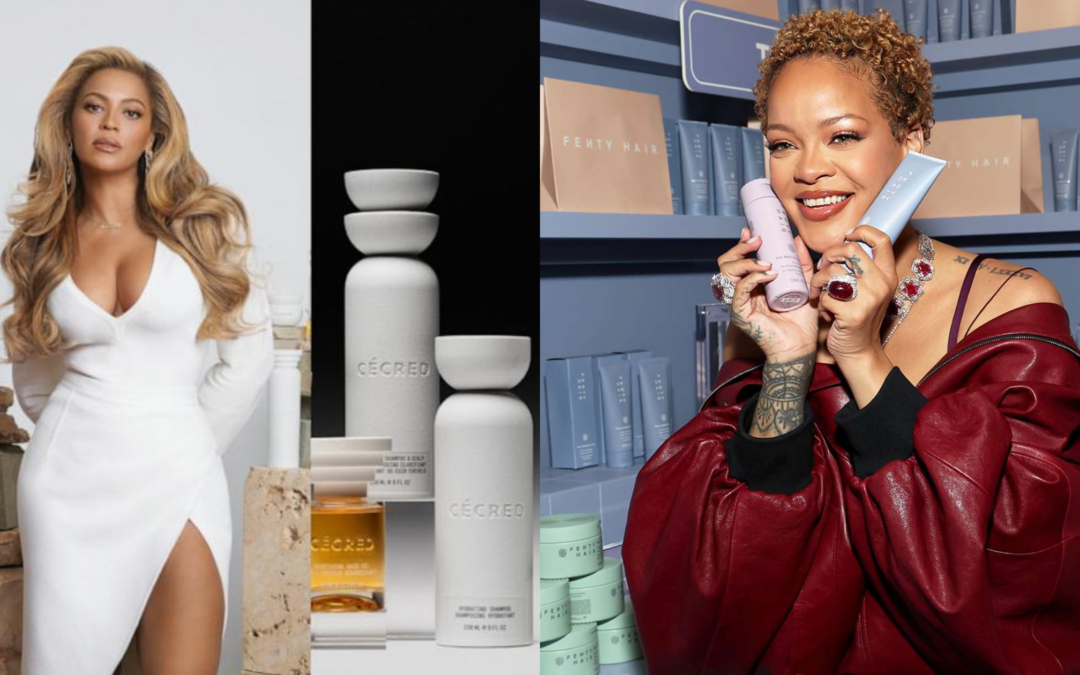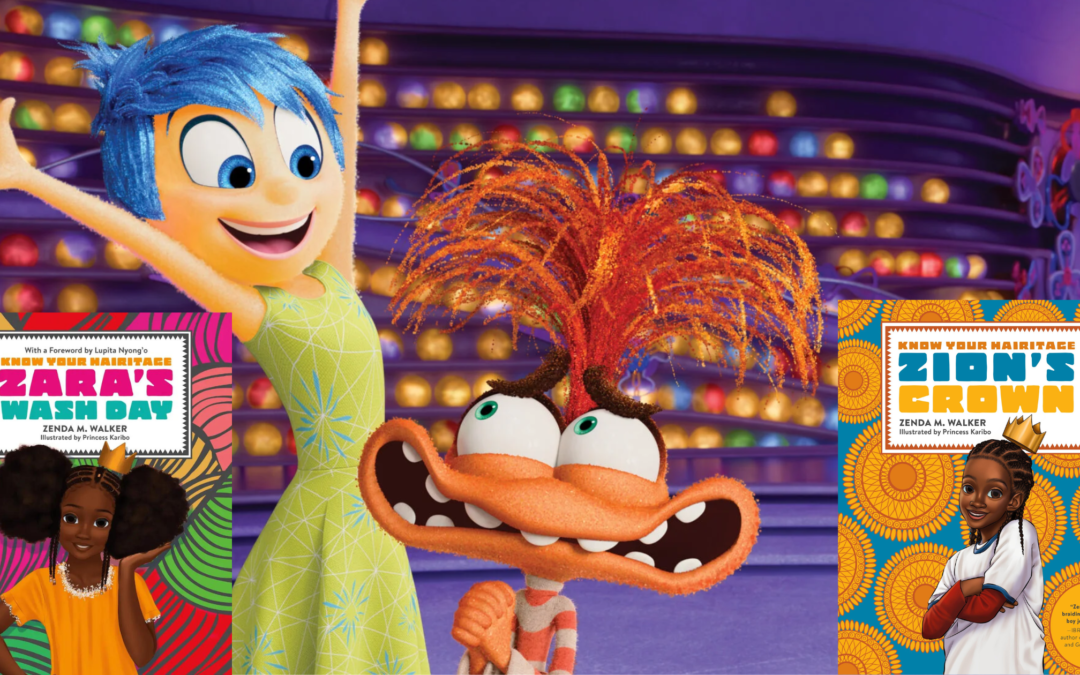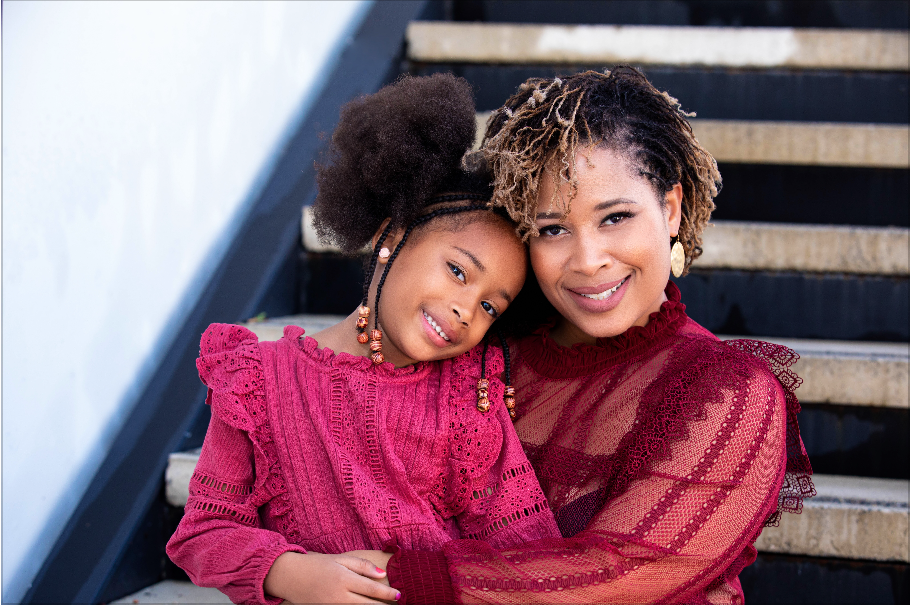
by Zenda Walker | Jun 28, 2024 | Business, Hairitage, Pop Culture & Hairitage, Textured Hair, Wash Day
The beauty industry is experiencing yet another revolution, with textured hair care evolving from the celebrity talent pool. Gone are the days of struggling to find products that meet the unique needs of Black and Brown hair. Today, we’re bombarded with an abundance of options, and that’s a cause for celebration, not competition.
This explosion of brands isn’t just a trend – it’s a reflection of the immense buying power of Black beauty consumers, which was a staggering $9.4 billion in 2023 with dollar, unit, and household growth outpacing growth for the United States according to a Nielson NIQ report. It’s no surprise that major retailers are taking notice and dedicating coveted shelf space to cater to this underserved market.
The arrival of celebrity brands like Beyoncé’s Cécred and Rihanna’s Fenty Hair has undoubtedly generated significant buzz. While some debate the launch strategies and product performance of these lines, others question if the celebrities themselves are “deserving” of success.
Here’s the truth: the beauty market is vast and diverse. Some consumers will gravitate towards premium, luxury brands like Cécred seeking high performance and a touch of exclusivity. Others will find loyalty in lines like Fenty Hair, offering reparative solution products for various curl patterns at a more accessible price point and distribution. And then there’s the value-conscious consumer who prioritizes budget over brand efficacy and loyalty.
Instead of getting caught up in celebrity endorsements, let’s focus on the bigger picture. Today, we’re no longer forced to settle for subpar options. We have the freedom to experiment, discover, and tailor a haircare regimen that celebrates our individuality.
This latest revolution didn’t happen overnight. We owe a debt of gratitude to the countless Black and Brown entrepreneurs who have been pushing boundaries for years. Pioneering brands like Kreyòl Essence by co-founders Yve-Car Momperousse and Stéphane Jean-Baptiste, Eden Bodyworks by Jasmine Lawrence, Taliah Waajid Brand by Taliah Waajid, TPH by Taraji P. Henson, Sienna Naturals by Issa Rae and Hannah Diop, 4U by Tia Lowry, Pattern Beauty by Tracee Ellis Ross, Carol’s Daughter by Lisa Price, TGIN by Cris-Tia Donaldson, Camille Rose by Janell Stephens, and Mielle Organics by Monique Rodriguez, along with countless others, paved the way for today’s flourishing marketplace. And we can’t forget about our Latinx founders who are changing the haircare game like, Babba Rivera of Ceremonia, La La Anthony of Inala, Julissa Prado of Rizos Curls, Aisha Cebellos-Crump of Honey Baby Naturals and Botanika Beauty, and Lulu Cordero of Bomba Curls.
Ultimately, the true winners in this beauty revolution are us, the consumers. We have the power to choose, to experiment, and to embrace the beauty of our coils in a multitude of ways. So, let’s celebrate the options, honor the pioneers, and most importantly, celebrate ourselves. The future of textured hair care is bright, and it’s a future built by and for us.
Zenda M. Walker is the award-winning author of “Zara’s Wash Day” and “Zion’s Crown”-two books in the Know Your Hairitage series. She is represented by The Seymour Agency.

by Zenda Walker | Jun 23, 2024 | Culturally Responsive Content, Natural Hair, Pop Culture & Hairitage, Textured Hair, Wash Day
The “Inside Out” franchise is making it much easier for parents to navigate those tough conversations about emotions. The first movie brilliantly introduced us to the development of a young girl’s emotions. Joy, Sadness, Anger, Disgust, and Fear learned to work together to safeguard Riley’s well-being. “Inside Out 2” tackles Riley’s teenage years, where new emotions take center stage, and she grapples with solidifying her sense of self. Enter Anxiety, Envy, Embarrassment, and Boredom (Ennui).
Watching Riley navigate these overwhelming emotions became a powerful metaphor for why I started writing books that celebrate “hairitage.” Through my research and countless conversations with clients over the past two decades, I’ve witnessed firsthand how deeply our hair stories are tied to self-perception. Memories shape beliefs, and the messages we receive about our hair, from family and society alike, have a profound impact.
Some clients I’ve spoken with grew up hearing affirmations about their beautiful, textured hair. For others, the narrative was vastly different. Words like, “ugly,” “difficult,” “messy,” and “unprofessional,” become too often associated with curly, coily, Afro-coily textures. Some received both positive and negative feedback, leaving them conflicted and perpetually unsure of themselves.
Black women, in particular, face a unique burden when it comes to societal expectations surrounding hair. That’s why it’s crucial for guardians, parents, and hairstylists to be hyper-aware of how they communicate with young people, especially during wash day. Positive experiences, in the emotional and physical developmental stages, can significantly impact a child’s self-esteem.
“Inside Out 2” cleverly highlights how our own childhood anxieties and traumas can sometimes resurface and influence our adult decisions. So, how can an adult with insecurities about their own textured hair empower a child to embrace theirs? The movie, perhaps unintentionally, offers a solution: it reminds us that occasional fear, anxiety, disgust, and anger are normal parts of life’s journey. We don’t have to bottle up these “maladaptive” emotions. Instead, acknowledging and accepting them can be the first step towards rediscovering joy. Perhaps this is why many of Riley’s core memories end up including multiple emotions, not just a single emotion formed in isolation.
Our hair wash day memories can embody several emotions, and discovering the joy in the journey is key to trusting the process and embracing our hair in all its glory.
My daughter, Zara, and I confronted the root of our hair insecurities by experimenting with techniques and products, ultimately finding joy in learning about the cultural hairstyles passed down in my family – a connection to a rich ancestral legacy. The experiences of Zara and Zion in my books, “Zara’s Wash Day” and “Zion’s Crown,” mirror this journey as well. While moments of fear, doubt, and frustration may still arise, our heightened awareness and appreciation for our hairitage make it easier to bounce back and rediscover feelings of joy.

by Zenda Walker | Mar 21, 2023 | Hairitage, Natural Hair, Textured Hair, Wash Day
Here’s some exciting news about KYH and the great ways we are infusing cultural beauty traditions around the world.
Three Steps I took to Enhance the Hair Wash Day Experience
Textured hair, ranging from afros to curls and coils, is an important aspect of Black women’s identity as it links to our culture, ancestry, and social and emotional well-being. The resurgence of the natural hair movement is challenging Eurocentric beauty norms, and we are here for it! As a hair stylist and natural hair enthusiast, I enjoy seeing people fully embracing their textured hair.
And while the natural hair movement has made strides towards dismantling negative attitudes towards curly, coily, Afro-coily hair, there is still some residual colonial sentiment that we, the Black and Brown textured hair community must continue to dispel. This is an inside job my friends. It starts with one of the most important beauty rituals practiced by so many people of African descent…Wash Day.
Hair wash day is the number of hours or days set aside to attend to the care and styling of textured hair. Curly, coily, textured hair requires additional moisture and due to the intricacies of some of our cultural hairstyles, often requires additional time and attention to detail. This makes wash day the best opportunity to bond with our loved-ones and speak life into each other, rather than perpetuate negative sentiments. So how can we change the narrative and continue to uphold the social and emotional health of our community? Here are the three “Ps” that changed the wash day routine for me and my daughter, Zara.
PREPARATION. Studies show that structured activities for children can create a sense of security and predictability. This can lead to better emotional regulation for both you and the child. Once I started to include Zara in the planning of Wash Day, she stopped rebelling and exhibiting signs of irritability. I even started to build excitement leading to our bi-monthly appointment by letting her know that I look forward to that time with her and letting her choose the hairstyle. It also helps to have the products you need on hand to create the end result and make sure you create buffer time to complete the appointment. You may also want to consider picking out a movie or music that can keep the child entertained throughout the appointment. This way, wash day is happening with the child and not to the child.
PATIENCE. As the leader of this 4C household, I know first-hand that the detangling process can present challenges, especially on a tender head. Some of my earliest memories of Wash Day was muscling through the pain of a heavy-handed auntie who had no issue silencing my cries and strongly suggesting that I “toughen up.” As an adult, I sarcastically joke with my girlfriends about this shared experience, but I admit that this iteration of “being seen and not heard” and suffering in silence was traumatic. I had to find a way to break the cycle for me and Zara. Today I recommend acknowledging the child’s discomfort and using detangling techniques/tools to minimize discomfort. For instance, gently finger detangling and misting the hair with a leave in conditioner can prep the hair prior to detangling with a comb or flexible detangling brush. Also, using wide-tooth comb to gently rake through small sections from the ends to the root can minimize damage and tugging. Lastly, bundling the detangled hair into loosely braided or two-strand twisted sections (6-8 depending on density), and shampooing and conditioning one section at a time to keep the strands detangled.
POSITIVITY. Speak life into the child and practice using affirming language, even in times of frustration. For example, our hair is not “difficult, tough, or hard to deal with.” The coils, curls, twists, and zig-zag strands have personality. Our hair is linked to our powerful ancestry. Then try showing children pictures of great Black leaders who have hair like them. This foundational information builds confidence which can transform how children and adults approach the world and see themselves. I noticed a huge difference in Zara’s self-esteem once I took this approach. Our collective transformation inspired the book “Zara’s Wash Day.”
We have the power to dismantle hundreds of years of negative attitudes towards our aesthetic. It will not happen overnight. But let’s hold hands because it takes a village.
Zenda Walker is the award winning author of Zara’s Wash Day and CEO of Know Your Hairitage,LLC-an inclusive education and business consulting firm. “Zara’s Wash Day” and the second book in the Know Your Hairitage series, “Zion’s Crown,” will be published globally under Running Press Kids in 2024. Visit www.knowyourhairitage.com for more information and booking inquiries.


